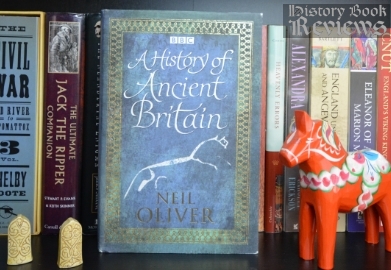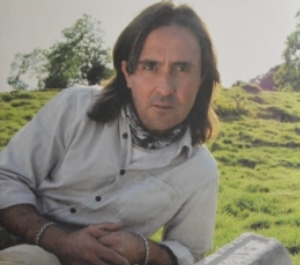A History of Ancient Britain
by Neil Oliver

Overview
- Author: Neil Oliver
- Published: 2012
- Topics: England, Archaeology, Ancient History, Evolution, Prehistory, Romans

Review
As I started reading Neil Oliver's A History of Ancient Britain I was very skeptical, due both to the nature of Oliver's credentials and to the oddly sensual photograph of him on the back of the book. So I was very surprised to find myself loving this book, drawn into Oliver's unique style of storytelling, and learning a great deal about the fascinating and often unbelievable prehistory of Britain.
This book was published to accompany a BBC television documentary series on the same topic. Neil Oliver is described on the back flap of the book as an archaeologist and historian, though all his work listings and credentials were all related to television and broadcasting. So I was a bit worried the book would not be very well-researched or scholarly. Oh, how I underestimated the integrity of BBC and its productions!!! This book was very intelligent and based on legitimate and academic sources (although the lack of any citations in the text threw me off at first), and did a wonderful job describing multitudes of archaeological discoveries and sites to illustrate the different cultures and time periods discussed. It combines the words and theories of professional scholars and archaeologists with those of farmers and landowners, giving a very integrated perspective of the ancient history of Britain and what it means to all who live there.
The scope of the book at first seemed overly ambitious, covering half a million years of human history in a mere 352 pages. Yet somehow each epoch was satisfyingly described and left me with a better understanding than I had previously. Oliver begins with a discussion of human evolution and the time frame for ancient hominids populating what is now Britain, and his information is accurate although with a few overly dramatic sections which made me laugh...such as his theory that the biblical figures of Jacob and Esau are meant to represent modern humans and Neanderthals (the red-headed Esau being the Neanderthal), and that Jacob's displacement of Esau (the rightful heir) represents our biologically ensconced guilt for displacing Neanderthals as the dominant human species. This was, however, more than made up for by the inclusion of the term "Gingerigines" (ginger aborigines) to describe redheads, since the study of the Neanderthal genome recently proved that these hominids had a wide variety of hair colors, including red hair.
The rest of the book follows the course of history, and traces the humans who have lived in Britain through the Stone Age, the Mesolithic, the Neolithic, the Bronze Age, the Iron Age, and the time of Roman occupation. Oliver colors the discussion of these time periods with a thorough review of written sources, interviews with archaeologists, detailed descriptions of archaeological sites and the artifacts recovered from them, and his own experiences learning from experts in these fields (which are often very funny, peppered with self-deprecating remarks about his own inadequacies in these areas). He covers the transition from hunter-gatherer ways of life to that of agriculture, the advent of megaliths like Stonehenge and other sites (with an interesting tie-in to the roots of religion and spirituality), the evolution of technology and metallurgy, and a new perspective of Roman occupation in Britain in the beginning of the 1st century AD. All these themes are effectively illustrated with descriptions of artifacts, burial sites, skeletal remains, earthworks and houses, and new theories based on scientific studies such as DNA analysis, isotope analysis, and linguistic evaluation.

Neil Oliver strikes a seductive pose for his book jacket.
Oliver's writing is conversational and sometimes poetic, which at first made me doubt his credibility as a scholar. However, the more I read the more I appreciated his style, which is engaging, descriptive, and personal. It is written with far more emotion than most history books, but this actually gave the book more impact and meaning, as the author's passion for history is practically alive in these pages, and it is infectious (and easy to relate to for me!). He describes seeing artifacts that are "enough to make a man cry" and that cause his hands to tremble. It is not common to read words like these in history books, but they are so expressive you can feel his excitement and love for the past. Sometimes it goes a bit too far, and results in semi-erotic love letters to Paleolithic hand axes and copper smelting (you just have to read it for yourself to believe it), but for the most part this just adds to the experience of the book.
Oliver's poetic imaginings of these people of the past contain a lot of imagination, and in his own words are "fanciful but not fantasy". His scenarios and theories are all based on facts, but some of the more "fanciful" ones should be read as interesting ideas of what life and people back then COULD have been like, not as concrete or widely accepted facts. One example is his description of Neolithic peoples' sadness and awareness of what they had lost (a hunter-gatherer lifestyle in exchange for settled agricultural communities) and a knowledge that they could never go back. This type of dramatization is dangerous, as it is hard enough to understand the emotions of other people TODAY, much less people thousands of years ago based on standing stones and some spiral carvings on rocks! Nonetheless, his evocative language and details of sights, sounds, and smells that would have filled these remote periods transported me back in time, and made those ancient people come to life and feel almost familiar.
All in all this book was fascinating, educational, and at times even thrilling. It is not always written as a solid history, containing some imaginative passages that read more like a novel, but these are few and far between and the majority of the book is very well-researched and built upon real archaeological discoveries and scientific evidence. I have never read another history book that makes you feel the past so strongly, and I enjoyed it more than I can say. This book is worth reading for any history lover, but if Britain is your passion (as it is mine!) it is absolutely not to be missed.


